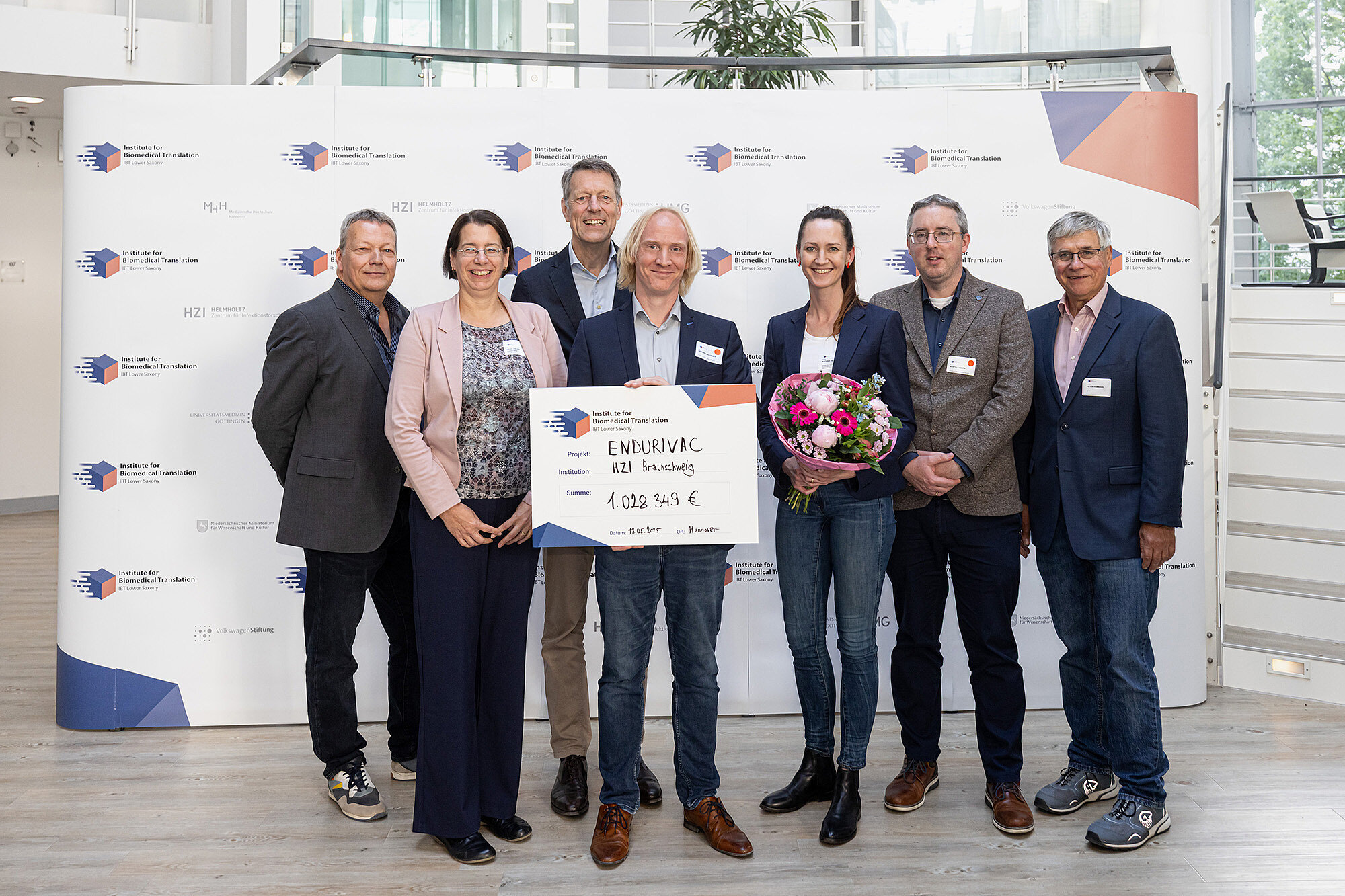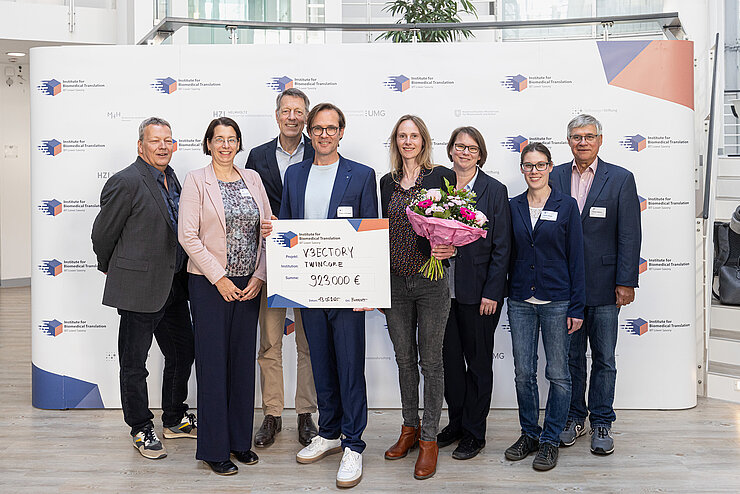ALLOMAB (TU Braunschweig)
Every year, more than 250,000 people die from B-cell cancer. We are developing a chimeric antigen receptor (CAR) T-cell therapy for acute B-cell lymphoblastic leukemia (ALL) that increases efficacy while reducing the side effects of current therapies. This is achieved by using a novel technology to regulate the activity of anti-cancer T-cells over the course of treatment. This can mitigate both excessive toxicities and the loss of efficacy due to T-cell exhaustion. The resulting "remotely controllable" CARs will significantly improve the clinical outcomes of aggressive cancer therapies and reduce relapse rates. ALLOMAB will utilize these new generation CARs using novel and virus-free methods for GMP-compliant T cell engineering through precise genome editing. This will further accelerate clinical translation and reduce the cost of cell-based therapies.
ENDURIVAC (HZI Braunschweig)
Current vaccines against important respiratory pathogens often do not provide lasting immune protection and require booster vaccinations. However, this leads to compliance problems and vaccination skepticism. Therefore, we have developed a unique, proprietary approach that utilizes murine cytomegalovirus (MCMV). MCMV is well tolerated in non-mice and yet elicits exceptionally long-lasting immune responses. Our goal now is to develop a vaccine platform based on our MCMV vector technology. Such vectors should provide long-term immunity against a broad spectrum of indications after a single immunization, thus eliminating the need for booster vaccinations. As part of the IBT, we will compare our first MCMV vaccine candidate against RSV in a relevant model with an approved vaccine. Prof. Kathrin de la Rosa from the Centre for Individualised Infection Medicine (CiiM), a joint institution of the HZI and the MHH, and Dr. Martin Ludlow (University of Veterinary Medicine) are co-applicants for ENDURIVAC.
HumanASE (Georg-August-University Göttingen)
Asparaginase, an enzyme-based drug that breaks down the amino acid asparagine, shows high therapeutic efficacy in acute leukemia and has significantly improved survival rates. However, due to the bacterial origin of the clinically used asparaginase (Oncaspar), around 30 percent of patients develop severe liver toxicity or hypersensitivity to asparaginase. This often leads to discontinuation of therapy and thus to significantly reduced survival rates. To avoid these side effects, we have developed a modified version of human asparaginase, the native version of which has very low activity. Our HumanASE is 99.7 percent identical to the wild-type protein, but is as effective as Oncaspar and efficiently lowers the asparagine level in the serum of mice without having a toxic effect.
HyCan (UMG)
This project aims to develop targeted therapies for female-specific cancers (endometrial, cervical and ovarian cancer), focusing on the degradation of histone deacetylases 3 and 8 (HDAC3/8). Current treatments often have significant side effects and are not selective. Our preliminary work has identified the role of HDAC3/8 in suppressing tumor cell apoptosis and promoting growth. Using targeted protein degradation via hydrophobic tagging (HyT) technology, we have synthesized a library of degraders and identified promising candidates for further development. Further development of these compounds could lead to more effective and less toxic therapies for gynecologic and potentially other aggressive cancers.
iGUARD-NEXT (MMH)
iGUARD-Next is developing inhalable RNAi therapeutics for viral respiratory infections. The technology platform offers a unique way of siRNA delivery by direct lipid conjugation of siRNAs to form self-assembling nanoparticles. These protect the siRNA from degradation and transport it directly to the site of infection. We are focusing on IND- enabled studies to advance the translational development of iGUARD-01, our lead candidate against HPIV3 (human parainfluenza virus 3).
Precision-RX (HAWK)
Precision-RX is developing a non-invasive platform to deliver drugs and gene therapies across the blood-retinal barrier (BRB) - a key challenge in the treatment of retinal diseases such as age-related macular degeneration (AMD), which affects nearly 196 million people. The system uses focused ultrasound and laser-induced photoacoustic pulses to temporarily and locally open the BRB, improving safety, precision and therapeutic reach. It can be integrated into standard fundus cameras or a future dedicated therapy station and includes a reusable control unit with a disposable ultrasound lens for monthly use.
SmartMembrane (TU Braunschweig)
In the near future, preclinical drug research will largely move away from animal testing and innovative in vitro test systems will be more widely used. In vitro test systems that can simulate organ functions have so far lacked the ability to reliably monitor the condition and quality of the tissue. This impairs reproducibility and makes approval by regulatory authorities more difficult. SmartMembrane systems overcome these limitations through a unique design that integrates special electrodes on porous membranes. The highly sensitive system has already proven to instantly recognize electronic tissue fingerprints with an informative value comparable to complex fluorescence imaging protocols. With the help of AI agents that interpret the fingerprints, states of tissue dynamics and drug reactions are recognized. With drastically reduced effort and costs and improved data quality, SmartMembrane will accelerate preclinical research and generate significant market value.
V3ECTORY (TWINCORE)
A vaccine against the hepatitis C virus (HCV) represents a significant unmet medical need and market opportunity. With V3ECTORY, we aim to demonstrate the superior immunogenicity and safety of our lead candidate. This is probably the most preclinical immunogenicity model on the market. The V3ECTORY results will be key to advancing preclinical development to first-in-human studies and beyond. Our ultimate goal is to provide a vaccine that eliminates the burden of HCV disease.






